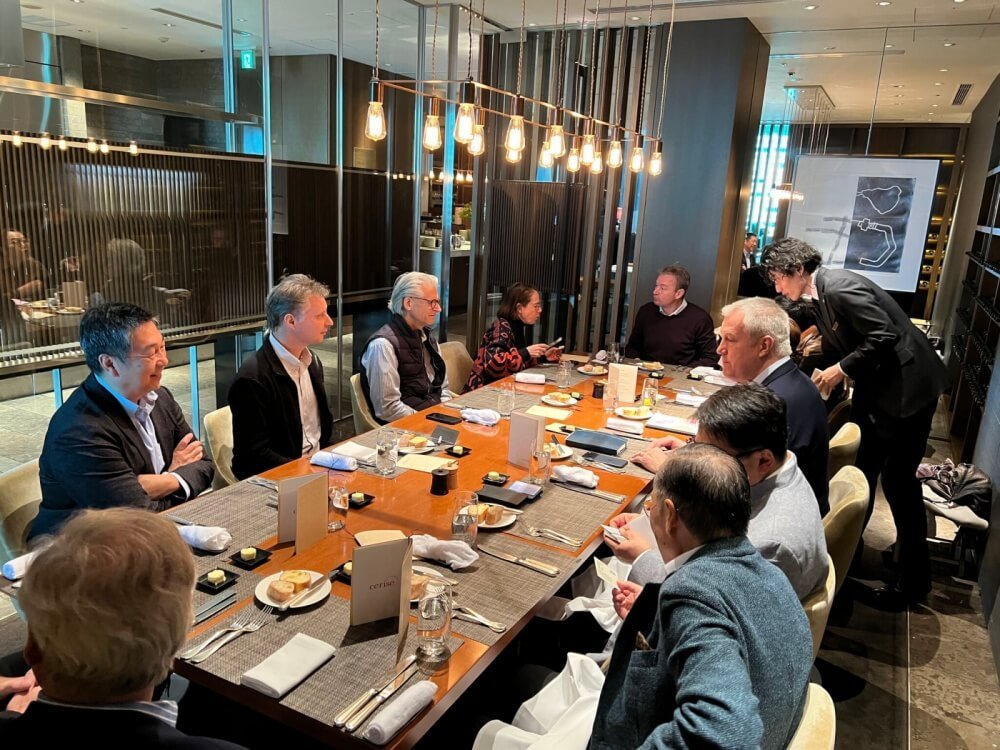Country Manager Insights: The Strategy for Brand Success in Japan
The role of a Country Manager in Japan is one of the most demanding executive positions in the world. Success requires navigating a market famous for its unique complexities, sophisticated consumer base, and intense competition. Crafting a winning Japan Strategy is not a simple "copy-paste" from global headquarters; it demands nuanced, transformative, and resilient Leadership. Last week, an exclusive retrospective by a seasoned executive offered invaluable, actionable lessons.
Just as assembling complex models requires vision, a successful Japan Strategy requires a Country Manager with adaptive Leadership to organize the intricate pieces of the local market.
Michael Ebbesen, the former head of one of the world's most beloved toy brands, LEGO, shared a brilliant account of his tenure. He detailed the critical pivot points, strategic decisions, and cultural alignments required to thrive.
This deep-dive session was a powerful vindication of The Delphi Network's event model. Small, "slow events" with hand-picked attendees and topics of absolute, practical relevance foster genuine insight. The impeccable service at Cerise in the Conrad Tokyo provided the perfect confidential setting for this high-level discussion.
The Challenge of Japanese Market Leadership
For decades, Japan has been a proving ground for global brands. It is a market where brand loyalty is deeply entrenched, quality expectations are non-negotiable, and the consumer is famously discerning. Many international firms have faltered by underestimating these nuances. They fail to understand that a successful market entry is only the beginning.
The real challenge is achieving sustainable, long-term growth. This is the core responsibility of the Country Manager. This leader must act as a critical bridge. They must translate the global vision to the local team and, just as importantly, translate local market realities back to global HQ. This often involves championing a unique Japan Strategy that may differ significantly from other regions.
The pressure on the Country Manager is immense. They must deliver on quarterly P&L expectations while simultaneously building the brand's long-term equity. They must innovate in digital and retail while respecting deep-seated cultural traditions. Furthermore, they must attract, train, and retain top-tier local talent in a highly competitive labor market. This is why peer-to-peer insight is not a luxury; it is a necessity.
A Confidential Retrospective on Success
The Delphi Essential Country Manager Know-How sessions are explicitly designed by Country Managers for Country Managers. They provide a precious opportunity to share tribulations and triumphs in a confidential, luxurious atmosphere.
In this intimate setting, a curated group of a dozen fellow executives engaged in a candid dialogue with Ebbesen. They enthusiastically shared their own experiences in solving similar, complex problems. Attendees forge strong human bonds at these events, which greatly improves both corporate and personal resilience. The session focused on the strategies behind the brand's successful post-pandemic transformation, and was a rare chance to gain actionable insights into cultural agility, digital growth, and strategic Leadership.
The Power of the Chatham House Rule
To ensure absolute candor, all Delphi Network events are held under the Chatham House Rule. This simple, powerful rule states that attendees are free to use the information received, but neither the identity nor the affiliation of the speaker(s), nor that of any other participant, may be revealed.
This policy is the cornerstone of the event's value. It transforms the discussion from a theoretical presentation into a practical, private problem-solving session. Senior leaders can speak openly about their challenges - such as market-entry friction, internal political hurdles, or strategic pivots - without fear of public exposure. This Leadership-level confidentiality is what allows for the sharing of real, hard-won lessons.
Deconstructing the Winning Japan Strategy
Peers and a seasoned Country Manager exchange confidential insights on refining a Japan Strategy and modern Leadership during a curated Delphi Network "slow event" at the Conrad Tokyo.
The discussion with Michael Ebbesen, an expert with over two decades of Leadership experience, crystalized into three core pillars. These pillars represent the blueprint for any Country Manager aiming to build a successful and resilient operation. Rather than providing a static checklist, the session explored the dynamic mindset required to balance a powerful global identity with Japan's unique market demands.
Takeaway 1: Achieving True Cultural Resonance
The first pillar is Vision. For LEGO, this meant adapting its core "Learning Through Play" mission. In a vacuum, this mission is globally understood. However, in Japan, the cultural context of "play" (asobi) and "learning" (manabi) is distinct, often seen as separate activities, with learning (especially juku, or cram school) being highly structured. A simplistic translation would have failed. The brand's success hinged on a deep cultural translation. This involved demonstrating how their form of play was, in itself, a vital and respected form of learning and development.
This is a critical lesson for any Country Manager. You cannot simply import your global brand mission. You must find the shared values between your brand and Japanese culture. This requires deep listening, cultural empathy, and the courage to adapt global marketing. It is the Leadership task of the Country Manager to find this authentic resonance. Failure to do so results in a brand that "floats" on the surface of the market without ever building deep, lasting roots with Japanese families and consumers.
Takeaway 2: Navigating Market Complexity
The second pillar examined the operational realities of the Japanese market. Japan is famous for its intricate distribution networks and high service expectations. The conversation delved into the challenges of modernizing commercial routes in a landscape that values tradition. The group discussed the friction that often exists between legacy partnerships and emerging commercial opportunities.
Ebbesen shared his perspective on the necessity of agility. A static Japan Strategy is a failing strategy. The discussion covered the importance of constantly evaluating channel mix and resource allocation. Leaders must be willing to make difficult decisions to future-proof the business, even when those decisions challenge the status quo. The ability to read the market's shifting currents (and pivot before it is too late!) is a defining characteristic of successful Leadership in this region. For a broader look at these market shifts, JETRO provides extensive analysis on Japanese commercial trends.
Takeaway 3: Alignment & Organizational Resilience
The third and perhaps most critical pillar was the human element. A brilliant strategy is useless without a team capable of executing it. The session devoted significant time to the challenges of fostering a unified culture within a multinational subsidiary. The participants debated the best methods for maintaining high engagement and alignment during periods of external disruption.
This is a profound Leadership challenge. The Country Manager must often act as a buffer and a bridge between the global headquarters and the local team. The conversation emphasized that building trust is not a "soft" goal; it is a strategic imperative. A resilient team that feels psychologically safe is more likely to innovate and adapt. The group shared experiences on how to empower local decision-making while staying aligned with global objectives. This internal cohesion is the engine that drives the entire Japan Strategy forward. For more on leading across cultures, Harvard Business Review offers excellent resources.
The Evolving Modern Country Manager
This discussion highlights a critical truth: the role of the Country Manager has fundamentally evolved. The "classic" expatriate executive, focused primarily on sales and P&L, is an outdated model. Today’s leader must be a holistic business driver. They must be a cultural translator, a digital evangelist, a brand steward, and a chief talent officer, all rolled into one.
This modern Country Manager is defined by their adaptability. They possess the commercial acumen to drive results today and the strategic Leadership to build the brand's foundation for the next decade.
This shift places enormous personal and professional demands on the individual. The isolation of the role cannot be overstated. The Country Manager is often the sole individual responsible for bridging the gap between a global parent company and the local Japanese reality. They navigate complex stakeholder relationships in multiple time zones, languages, and cultural contexts.
Beyond the P&L: Forging Corporate Resilience
This is why personal and corporate resilience are so interconnected. A burned-out leader cannot lead a resilient team. The Delphi Network's model directly addresses this. By forging strong human bonds in a confidential setting, attendees build a personal "board of directors." This peer network becomes a vital resource for sharing burdens, validating ideas, and finding solutions. This is not just a "soft" benefit; it is a hard-edged strategic advantage.
A Country Manager who is supported by a network of peers is less likely to make critical errors. They are more informed, more confident,, and more resilient. This personal resilience translates directly into corporate resilience, creating a more stable, agile, and successful Japanese operation. Protecting the executive's well-being is critical to long-term success.
Actionable Insights for Your Japan Strategy
The insights from this session are not merely theoretical. They are a practical guide for any leader in Japan. Whether you are a newly-appointed Country Manager, a founder navigating market entry, or an executive in marketing or HR, the lessons are clear.
Re-validate Your Vision: Are you simply translating your mission, or are you achieving true cultural translation?
Audit Your Strategy: Is your Japan Strategy truly fit-for-purpose in a digital-first world?
Invest in Leadership: Are you actively building a diverse, resilient, and high-performing internal culture?
This event was a powerful reminder that success in Japan is a team sport, and the most effective Leadership involves learning from the tribulations and triumphs of others.


